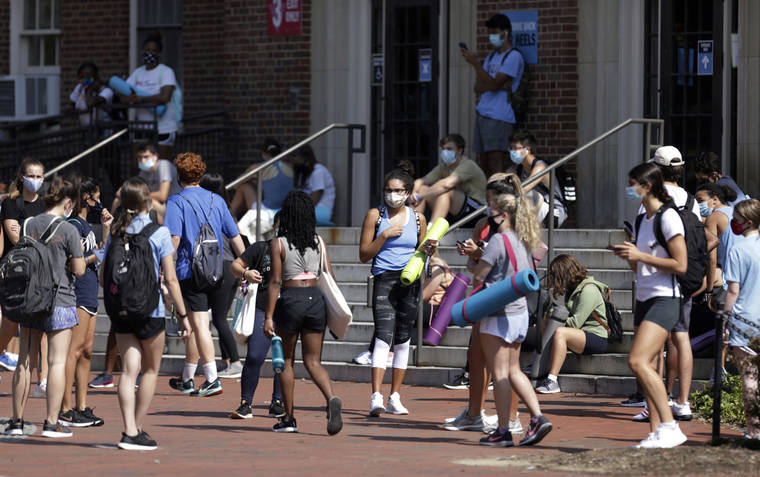North Carolina’s flagship university canceled in-person classes for undergraduates just a week into the fall semester Monday as college campuses around the U.S. scramble to deal with coronavirus clusters linked in some cases to student housing, off-campus parties and packed bars.
The University of North Carolina at Chapel Hill said it will switch to remote learning on Wednesday and make arrangements for students who want to leave campus housing.
“We have emphasized that if we were faced with the need to change plans — take an off-ramp — we would not hesitate to do so, but we have not taken this decision lightly,” it said in a statement after reporting 130 confirmed infections among students and five among employees over the past week.
UNC said the clusters were discovered in dorms, a fraternity house and other student housing.
Before the decision came down, the student newspaper, The Daily Tar Heel, ran an editorial headlined, “UNC has a clusterf—k on its hands,” though without the dashes.
The paper said that the parties that took place over the weekend were no surprise and that administrators should have begun the semester with online-only instruction at the university, which has 19,000 undergraduates.
“We all saw this coming,” the editorial said.
Outbreaks earlier this summer at fraternities in Washington state, California and Mississippi provided a glimpse of the challenges school officials face in keeping the virus from spreading on campuses where young people eat, live, study — and party — in close quarters.
The virus has been blamed for over 170,000 deaths and 5.4 million confirmed infections in the U.S.
Many schools already have flipped from in-person classes to mainly online in recent weeks, and more are expected to do so, said David Long of Tuscany Strategy Consulting, which teamed up with the Johns Hopkins Center for Health Security and the Council for Higher Education Accreditation to develop reopening recommendations for colleges and universities.
“It’s because it’s so difficult to create these systems where everybody is essentially behaving appropriately, meaning social distancing, wearing PPE and not gathering in groups,” he said, referring to personal protective equipment. “It’s challenging when you’re trying to control behavior in young adults, particularly in areas that are outside the classroom and off campus.”
Some schools are opting for social contracts and strict codes of conduct as a way for students to keep pressure on their classmates, he said.
At Oklahoma State in Stillwater, where a widely circulated video over the weekend showed maskless students packed into a nightclub, officials confirmed 23 coronavirus cases at an off-campus sorority house. The university placed the students living there in isolation and prohibited them from leaving.
“As a student, I’m frustrated as hell,” said Ryan Novozinsky, a junior from Allentown, New Jersey, and editor of the student newspaper. “These are people I have to interact with.” And, he added, “there will be professors they interact with, starting today, that won’t be able to fight this off.”
OSU has a combination of in-person and online courses. Students, staff and faculty are required to wear masks indoors and outdoors where social distancing isn’t possible.
The University of Notre Dame reported 58 confirmed cases since students returned to the South Bend, Indiana, campus in early August. At least two off-campus parties over a week ago have been identified as sources, school officials said.
Paul J. Browne, vice president for public affairs at Notre Dame, said the university is prepared to suspend or otherwise discipline the hosts of such parties.
“We believe we have a very strong chain of health protection, but these parties represent the weak link in that chain, and they can be responsible for a disproportionate spread,” he said.
University officials in Tennessee, Georgia and Alabama were likewise frustrated by the lack of social distancing and scenes of crowded bars and other nightspot areas on the first weekend many students returned to school.
In Tuscaloosa, the home of the football-mad University of Alabama, Mayor Walt Maddox appealed to students’ love of the game in urging them to take precautions.
“If you don’t want to protect yourself and you don’t want to protect your family and you don’t want to protect your friends and thousands of jobs, maybe, just maybe, you would want to protect football season so we can have it this fall,” Maddox said.
Some universities are still moving ahead with fall classes. At Bradley University in Peoria, Illinois, where a dozen students tested positive last month after an off-campus gathering, classes start Aug. 26 and students are moving into dorms this weekend.
“We have tweaked the move in process this year and are requiring students to sign up for a time slot so we can keep things spaced out and distanced,” university spokeswoman Renee Charles said.
Balancing the health risks with educating students has been keeping university presidents up at night, said Mildred García, head of the American Association of State Colleges and Universities. She said many are reconsider their plans as things change rapidly.
“They are doing the best they can with their staff and trying to educate the students about masks and social distancing and the effects of this virus,” she said.
“They’re doing all they can — and yet these are young people. When we think back about when we were young, sometimes you think you’re invincible.”
———
Associated Press writers Sean Murphy in Oklahoma City; Jay Reeves in Birmingham, Alabama; Katie Foody in Chicago; Collin Binkley in Boston; Dave Kolpack in Fargo, North Dakota; and Jonathan Drew in Durham, North Carolina, contributed to this report.


